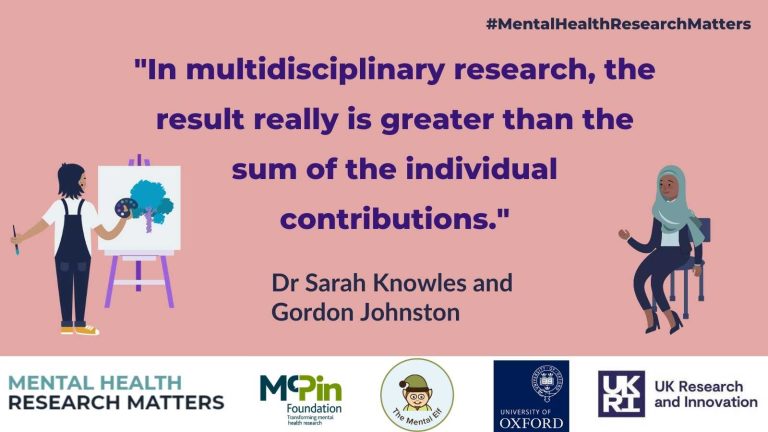
Dr Sarah Knowles, Knowledge Mobilisation Research Fellow at the University of York, and Gordon Johnston, peer researcher and Closing the Gap steering committee member, and Mental Health Research Matters steering group member write about the many benefits of multidisciplinary approaches to mental health research
“Working across disciplinary and professional boundaries encourages researchers to think bigger about their projects – who does this help? Who does this matter to? and what does this mean to the people who we expect to use this evidence in practice?”
The mental health research community can seem like a defined group of researchers from a small number of disciplines. Expertise and interest in psychiatry, psychology and nursing are all common. However, increasingly, researchers and practitioners from a much wider range of disciplines are contributing positively to good mental health research.
The Closing the Gap Network at the University of York focuses on addressing the physical health inequalities experienced by people with severe mental ill health. Our themes are deliberately wide-ranging, bringing new collaborators and new thinking into mental health research.
From the start we’ve involved many people who don’t work in mental health – and who may not have even thought about the mental health impacts of their work before.
We’ve worked directly with ecologists and geographers on our Green and Blue Space theme, and with design researchers and creative practitioners on our Co‑Design and Creativity theme. We’ve involved data scientists and health economists, as well as people with lived experience and those from third sector organisations.
In addition to this interdisciplinarity in research topics, we’ve also funded several projects that bring different professional roles together, with dentists and occupational health psychologists collaborating with GPs and psychiatrists
An unexpected superpower
As we come to the end of the network, we’ve been talking a lot about impact: what it means and how it is achieved. When discussing this with Gordon Johnston, he commented that this interdisciplinarity gives us an unanticipated impact superpower. Specifically, it adds novelty and even surprise to elevate messages about mental health in peoples’ awareness.
It is common to hear a psychiatrist or a mental health researcher talking about the importance of addressing mental health. That message is amplified when it comes from an unexpected source.
If an ecologist or a dentist talks about mental health, this adds weight to the discussion. It also shows how wide ranging the problem is, and how many different people are motivated to work together to address it.
Thinking bigger and introducing new perspectives
This isn’t just about expanding the reach of our mental health message, though.
While evaluating the impact of Closing the Gap network, our steering group, which includes third-sector representatives and people with lived experience, emphasised an important message: the extent to which research addresses meaningful questions and tackles questions that matter to patients and professionals, is crucial to whether that research can have impact.
Working across disciplinary and professional boundaries encourages researchers to think bigger about their projects – who does this help, who does this matter to, and what does this mean to the people who we expect to use this evidence in practice?
When a researcher is in the room with, for example, a dentist who wants to give his patients better care at the point they are designing a study, the dentist will help the researcher design the study with these end goals in mind.
Dr Vishal Aggarwal from University of Leeds told us, “As a dentist, the benefits of being involved in mental health research highlight the need for a whole-person approach rather than just focusing on their teeth without considering the impact of their underlying mental health on oral health.”
This kind of collaborative working can energise and challenge the groups involved, supporting new perspectives or opening up new opportunities.
Professor Piran White from University of York found that, “An ecologist’s understanding of processes and feedbacks in the natural world provides a useful foundation for collaborating with health scientists and others in mental health research.”
Joining together, and getting out of our typical siloes, helps us see what we have to offer and how we can complement each other. In multidisciplinary research, the result really is greater than the sum of the individual contributions.
Working together is a necessity
Mental health is a topic that demands interdisciplinarity. You simply can’t reduce the experience of mental illness to a single topic when it has such complex and wide-ranging causes and effects.
The benefits we’ve seen in Closing The Gap demonstrate that this push to interdisciplinary working can make better research happen, can better communicate the value of that research, and can inspire researchers to design their projects with impact considered from the start, rather than as an afterthought.
We’ve shown that mental health research is a team sport.
People can have different specialties, different roles and different expertise, but we all have the same goal: to do better mental health research together that really matters.
